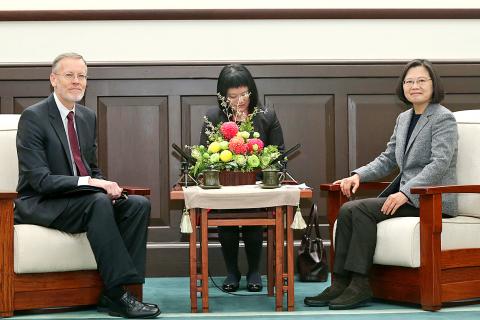President Tsai Ing-wen (蔡英文) yesterday met separately with American Institute in Taiwan (AIT) Director Brent Christensen and Japan-Taiwan Exchange Association Chairman Mitsuo Ohashi, expressing the hope to improve bilateral ties with the two countries.
Christensen congratulated Tsai on behalf of the US government on her re-election, saying that the US and Taiwan are close partners bound by shared democratic values, and would continue to improve bilateral exchanges.
Saturday’s “election serves as a reminder that the United States and Taiwan are not just partners; we are members of the same community of democracies, bonded by our shared values,” he added.

Photo: CNA
Tsai said that “democracy and freedom are indeed Taiwan’s most precious assets, as well as the foundation for the long-standing, firm Taiwan-US partnership.”
“We are both irreplaceable partners in the international community, as well as key players in regional democratic development,” she added.
Tsai later met with Ohashi, who heads the association that represents Japanese interests in Taiwan in the absence of official ties.
Congratulating Tsai on her victory, Ohashi said that Tsai meeting with him despite her busy schedule “is the best testament to the importance that Taiwan attaches to its relationship with Japan.”
Ohashi’s visit was an indication of the good relations between Taiwan and Japan, Tsai said.
Japan is a vital ally in terms of diplomatic cooperation and tourism exchanges, she said, adding that “in the new year, we hope to see even more exchanges and cooperation between Taiwan and Japan in business, trade, culture and sports.”
Taiwan would continue to work with like-minded countries to deepen its democracy, Tsai said.
As a responsible member of the international community and to maintain stability across the Taiwan Strait, Taiwan over the past three years has been adhering to the principles of not succumbing to pressure from China, not provoking Beijing and not precipitately advancing relations with China, she added.
Taiwan would keep adhering to the principles and would improve its partnerships with other Asian nations to promote prosperous development in the region, Tsai said.
Sankei Shimbun yesterday reported that the Japanese government would continue to collaborate with Taiwan, which it deems an important partner with shared core values.

PREPAREDNESS: Given the difficulty of importing ammunition during wartime, the Ministry of National Defense said it would prioritize ‘coproduction’ partnerships A newly formed unit of the Marine Corps tasked with land-based security operations has recently replaced its aging, domestically produced rifles with more advanced, US-made M4A1 rifles, a source said yesterday. The unnamed source familiar with the matter said the First Security Battalion of the Marine Corps’ Air Defense and Base Guard Group has replaced its older T65K2 rifles, which have been in service since the late 1980s, with the newly received M4A1s. The source did not say exactly when the upgrade took place or how many M4A1s were issued to the battalion. The confirmation came after Chinese-language media reported

A Ministry of Foreign Affairs official yesterday said that a delegation that visited China for an APEC meeting did not receive any kind of treatment that downgraded Taiwan’s sovereignty. Department of International Organizations Director-General Jonathan Sun (孫儉元) said that he and a group of ministry officials visited Shenzhen, China, to attend the APEC Informal Senior Officials’ Meeting last month. The trip went “smoothly and safely” for all Taiwanese delegates, as the Chinese side arranged the trip in accordance with long-standing practices, Sun said at the ministry’s weekly briefing. The Taiwanese group did not encounter any political suppression, he said. Sun made the remarks when

The Taiwanese passport ranked 33rd in a global listing of passports by convenience this month, rising three places from last month’s ranking, but matching its position in January last year. The Henley Passport Index, an international ranking of passports by the number of designations its holder can travel to without a visa, showed that the Taiwan passport enables holders to travel to 139 countries and territories without a visa. Singapore’s passport was ranked the most powerful with visa-free access to 192 destinations out of 227, according to the index published on Tuesday by UK-based migration investment consultancy firm Henley and Partners. Japan’s and

BROAD AGREEMENT: The two are nearing a trade deal to reduce Taiwan’s tariff to 15% and a commitment for TSMC to build five more fabs, a ‘New York Times’ report said Taiwan and the US have reached a broad consensus on a trade deal, the Executive Yuan’s Office of Trade Negotiations said yesterday, after a report said that Washington is set to reduce Taiwan’s tariff rate to 15 percent. The New York Times on Monday reported that the two nations are nearing a trade deal to reduce Taiwan’s tariff rate to 15 percent and commit Taiwan Semiconductor Manufacturing Co (TSMC, 台積電) to building at least five more facilities in the US. “The agreement, which has been under negotiation for months, is being legally scrubbed and could be announced this month,” the paper said,